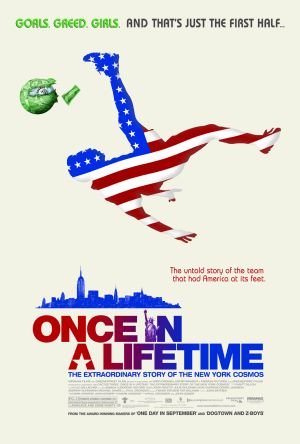
Once in a Lifetime: The Extraordinary Story of the New York Cosmos Page #2
cable, you know.
'Company doing $6 billion a year,'
and he's enamored
with going into a locker room.
'But for what reason?
What purpose was he obsessed with it?
'What was that all about?'
The big bang of the Cosmos
began with a backbeat.
And two brothers from Istanbul.
responsible for more classic vinyl
than Elvis and the Beatles put together.
Ahmet founded Atlantic Records
in 1947.
Warner Communications
bought Atlantic 20 years later,
and the Erteguns went to work
for Steve Ross.
Here we were,
two New York businessmen,
who had this love of soccer.
'My brother decided
And Steve Ross said, "If you'll stay,
I'll do anything that you like."
So my brother said to Steve Ross,
a professional soccer/football team."
Nesuhi Ertegun came to me
"Soccer is going to be the biggest sport.
It is the biggest sport in the world.
"Clearly it's going to overtake America."
Television viewers in the US
of world football's potential in 1966.
They saw almost 100,000 fans
pack Wembley Stadium
for the final between
England and West Germany,
as the BBC broadcast
was carried live in America.
In one of the most thrilling matches
ever played,
young Beckenbauer and his team-mates
could not stop England's Geoff Hurst.
'England... it's a goal!'
'Some people are on the pitch,
they think it's all over...
'It is now!'
In the UK alone, 32 million viewers
tuned in to the extra time thriller.
Still the biggest audience
in BBC history.
You can't have a professional league
without having investors convinced.
I think the showing of the World Cup
in 1966 was the turning point.
'That convinced them
that it could happen in this country.'
The American game of the same name
was flourishing
with the birth of the Super Bowl and
the first network television contracts.
franchises had become over the years,
sometimes quite quickly,
worth millions of dollars.
'Soccer franchises were very cheap,
so you had the opportunity'
of getting in on something
on the ground floor.
Emboldened by
American investors backed not one but
two professional US soccer leagues.
'Trying to find an American
who could play soccer,'
American-born who could play soccer,
it just wasn't there.
By 1968, the two leagues
had collapsed into one-
the North American Soccer League-
featuring five largely failing franchises.
We knew if the league
was going to be a success
'and get the media sponsorship
and television attention,'
that we had to have
Translation
Translate and read this script in other languages:
Select another language:
- - Select -
- 简体中文 (Chinese - Simplified)
- 繁體中文 (Chinese - Traditional)
- Español (Spanish)
- Esperanto (Esperanto)
- 日本語 (Japanese)
- Português (Portuguese)
- Deutsch (German)
- العربية (Arabic)
- Français (French)
- Русский (Russian)
- ಕನ್ನಡ (Kannada)
- 한국어 (Korean)
- עברית (Hebrew)
- Gaeilge (Irish)
- Українська (Ukrainian)
- اردو (Urdu)
- Magyar (Hungarian)
- मानक हिन्दी (Hindi)
- Indonesia (Indonesian)
- Italiano (Italian)
- தமிழ் (Tamil)
- Türkçe (Turkish)
- తెలుగు (Telugu)
- ภาษาไทย (Thai)
- Tiếng Việt (Vietnamese)
- Čeština (Czech)
- Polski (Polish)
- Bahasa Indonesia (Indonesian)
- Românește (Romanian)
- Nederlands (Dutch)
- Ελληνικά (Greek)
- Latinum (Latin)
- Svenska (Swedish)
- Dansk (Danish)
- Suomi (Finnish)
- فارسی (Persian)
- ייִדיש (Yiddish)
- հայերեն (Armenian)
- Norsk (Norwegian)
- English (English)
Citation
Use the citation below to add this screenplay to your bibliography:
Style:MLAChicagoAPA
"Once in a Lifetime: The Extraordinary Story of the New York Cosmos" Scripts.com. STANDS4 LLC, 2024. Web. 18 Apr. 2024. <https://www.scripts.com/script/once_in_a_lifetime:_the_extraordinary_story_of_the_new_york_cosmos_15212>.


Discuss this script with the community:
Report Comment
We're doing our best to make sure our content is useful, accurate and safe.
If by any chance you spot an inappropriate comment while navigating through our website please use this form to let us know, and we'll take care of it shortly.
Attachment
You need to be logged in to favorite.
Log In